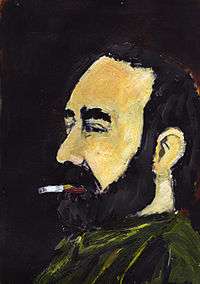Herberto Hélder
Herberto Helder de Oliveira (Funchal, São Pedro, November 23, 1930 – Cascais, March 23, 2015) was a Portuguese poet often considered the most important Portuguese poet of the second half of the 20th century.[1]
Herberto Helder | |
|---|---|
 | |
| Born | Herberto Helder de Oliveira November 23, 1930 Funchal, Madeira, Portugal |
| Died | March 23, 2015 (aged 84) Cascais, Portugal |
| Occupation | Poet, writer |
| Nationality | Portuguese |
| Period | 1958–2015 |
| Notable awards | Prémio P.E.N. Clube Português de Poesia (1983) Prémio da Crítica da Associação Portuguesa de Críticos Literários (1988) Pessoa Prize (1994) |
| Spouse | Maria Ludovina Dourado Pimentel Olga da Conceição Ferreira Lima |
| Children | Gisela Ester Pimentel de Oliveira Daniel Oliveira |
Biography
Herberto Helder was born in the Portuguese Atlantic island of Madeira.[2] In 1946 he traveled to Lisbon to complete his secondary studies and subsequently in 1948 moved to Coimbra to study Law at university. In 1949 he had changed to the Humanities University to study Romance Philology but dropped out after three years without completing the course. After returning to Lisbon he took up several temporary jobs, and got in contact with a circle of artists and writers such as Mário Cesariny, Luiz Pacheco, João Vieira and Hélder Macedo. This group revolved around Surrealism which would inform his early writings. In 1958 his first book, O Amor em Visita was published. In the following years he traveled and lived in France, Holland and Belgium taking menial jobs to survive.
In 1994, he was the winner of the Pessoa Prize, which he refused, saying "Don't tell anyone and give the prize to someone else ..." [3]
Works
Herberto Helder's poetry and fiction is very visual, and has connections with Surrealism, still his style is difficult to define; he was a practitioner of experimental poetry and some call him an orphic or visionary poet (that somehow reminds Ezra Pound).
Considered one of the most important contemporary Portuguese poets his poetry is not yet enough studied by academics due to the obscurity of his personality itself (he refused to take literary prizes or have media exposure) and the complexity of his paradoxal work that has a strange enchantment.
Published works
Poetry
- O Amor em visita (Love in visit), Lisbon, 1958
- A Colher na Boca (The spoon in the mouth), Lisbon, 1961
- Poemacto (Poemact), Lisbon, 1967
- Lugar (Place), Lisbon, 1962
- Electronicolirica (Electronicalyrics), Lisbon, 1964
- Húmus (Humus), Lisbon, 1967
- Retrato em movimento (Portrait in movement), Lisbon, 1967
- O bebedor nocturno (The nocturnal drinker), Lisbon, 1968
- O ofício cantante (The singing craft), Lisbon, 1968
- Cobra (Snake/Cobra), Lisbon, 1977
- Photomaton e Vox (Photomaton and Vox), Lisbon, 1979
- Poesia Toda (All Poetry), Lisbon, 1981
- A Cabeça entre as mãos (The head between the hands), Lisbon, 1982
- As Magias (1987)
- Última Ciência (1988)
- Do Mundo (1994)
- Poesia Toda (1º vol. de 1953 a 1966; 2º vol. de 1963 a 1971) (1973)
- Poesia Toda (1ª ed. em 1981)
- A Faca Não Corta o Fogo – Súmula & Inédita (2008)
- Ofício Cantante (2009)
- Servidões (2013)
- A Morte sem Mestre (2014)
- Poemas canhotos (2015) - Finished just before his death, published two months after the author's death.
Fiction
- Os passos em volta (The steps around), Lisbon, 1963
- Apresentação do rosto (Presentation of the face), Lisbon, 1968
References
- VITÓRIA, ANA (May 7, 2009). "Robô poeta de Leonel Moura lança livro". Jornal de Notícias (in Portuguese). Retrieved July 9, 2011.
- "A short biography of Herberto Helder". Citi.pt - Lisbon University (in Portuguese). Archived from the original on September 30, 2014. Retrieved August 20, 2014.
- "Quando Clara e António Alçada foram avisar Herberto do Prémio Pessoa". Expresso (in Portuguese). March 24, 2015. Retrieved January 20, 2020.